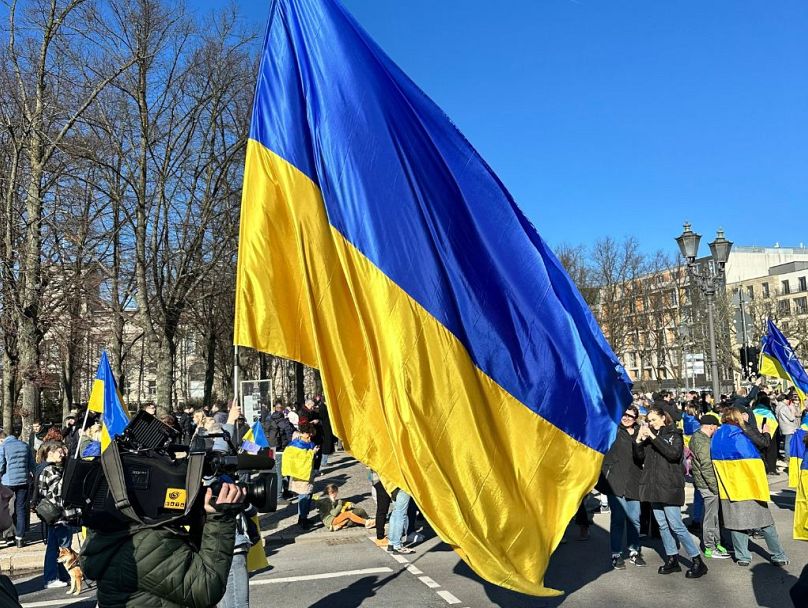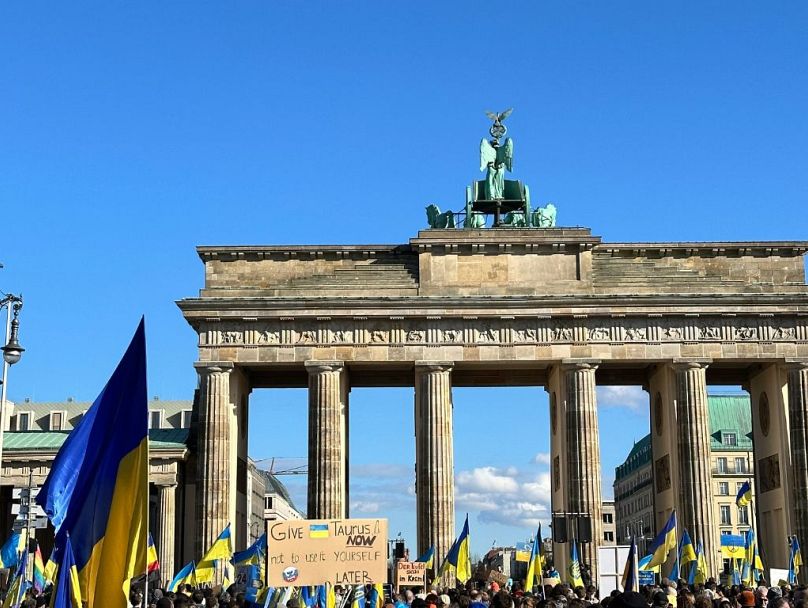Last weekend marked the second grim anniversary of Russia’s full-scale invasion of Ukraine. Many people around the world commemorated this day by taking to the streets in big cities.
Last weekend marked the second grim anniversary of Russia’s full-scale invasion of Ukraine. Many people around the world commemorated this day by taking to the streets in big cities. In Berlin, the protest was organised by Vitsche, an association of young Ukrainians based in Germany. The group organises protests, cultural and educational gatherings, offers support to refugees, and coordinates humanitarian efforts for Ukraine with the aim of amplifying Ukrainian voices in Germany.
The term "vitsche" has a long history within the Ukrainian language, dating back to the early stages of Ukrainian society, around the sixth century. It refers to a council that collectively makes decisions and enacts changes to serve the community. That’s why the group has chosen this name for their organisation, recognising its deep significance in Ukrainian heritage.
Before the full-scale invasion, the group already had a feeling of the horrors that were going to follow. Their first protest took place one month before Russian troops invaded Ukraine, when tensions were running high at the border. Back then, their protests were quite small. This year, several thousand people have joined their demonstration.
For two years now, Vitsche has been dealing with the war on a daily basis by raising awareness on their social media channels and organising events. Press speaker, Krista-Marija Läbe, says they don't want to feel or convey that nothing can be done. “The situation is even more serious than it was two years ago, but we can still make a significant difference. We have the means to continue supporting Ukraine so that it can win this war. Therefore, each of our members is committed to ensuring that people understand how Ukraine can be helped and that it needs to happen quickly. That gives us tremendous strength,” she added.
Losing this war could mean losing our national identity
Krista was born in Ukraine but grew up in Germany. Although she herself has been lucky enough to have no casualties in her family, some of her family members had to flee Ukraine. “I worry about my two younger nephews; the elder, now 13, may be conscripted if the war goes on.” This struggle is not just about physical safety, but also about preserving our Ukrainian identity and existence. “Losing this war could mean losing our national identity. It's a concern shared by many, including myself, who fear we may never be able to return to Ukraine. The toll has been immense, with countless friends, family, and colleagues facing unimaginable losses over the past two years,” Krista told me.
There is no doubt that Ukrainians want to continue defending their country and liberating the occupied territories because there simply is no alternative. “The alternative is for the entire Ukraine to look like the occupied territories now,” said Krista. “There are no human rights, there is no rule of law there, children and civilians are abducted, there are torture chambers - there is no safety for these people.”
More can be done
“I need ammunition, not a ride” is what President Volodymyr Zelenskyy has allegedly said after having been offered to evacuate two years ago when the war started. This statement still rings true today. Ukraine is currently suffering from an ammunition shortage, which has led to the withdrawal of strategic key-points, such as Avdiivka. But more can be done, said Krista. “Even if the US elections don't go our way, we can still do something. We can provide much more support – with weapons, financially, and by transferring Russian assets to Ukraine."
Krista adds: "There's so much room for action, even within international law. I expect the rest of Europe to step up their support because our entire future is at stake, as is the future of the entire continent. We're in a very difficult situation, but we must not give up. We need to continue supporting Ukraine. This year will be extremely tough. It will be a difficult year for Ukraine, starting under the worst conditions with a shortage of ammunition. We don't have enough ammunition to support cities with air defences, nor do we have enough at the front lines. Yet, Ukrainians are refusing to give up.”
The war has already arrived in Germany
From Berlin, despite the frontline being over 2,000 kilometres away, Krista emphasises that the war has already reached Germany. “It's also an information war, and Russian disinformation has been active here for years. We simply need to raise greater awareness that we have been directly affected by it for a long time,” she said. Since the start of Russia's aggression against Ukraine, the German government has observed a rise in disinformation from Russian-controlled media and diplomatic channels. According to the Federal Interior Ministry, Russian government bodies are increasingly using various channels to manipulate perceptions, justifying their actions and vilifying Ukraine while portraying the West as hostile.
Dimitri Androssov: I called my friends in Ukraine and cried
Dimitri Androssov fled Russia in May 2022 and now works at the German Bundestag. He faced persecution in his home country for protesting against the Russian full-scale invasion of Ukraine. The 24th of February is particularly painful for him. “I didn't sleep at all that night,” he said. “The first reports from Ukraine came in around five in the morning. That speech by Putin… It was an eerie feeling. I called my friends in Ukraine and cried.”
Shortly after, Androssov called for protests against the war on social media. He started protesting as soon as he could and soon after got arrested. When he was released in March of the same year, he tried to engage in anti-war activities. In May, he was arrested again and beaten and choked at the police station. After that, he left his homeland.
He firmly believes there will be no end to the war until Russian troops are defeated in Ukraine. "It is up to the West to support Ukraine so strongly that it is able to free itself," he told Euronews.
While the West has now understood the true intentions of Russian President Vladimir Putin, the nature of his regime is still not clear to many people. "These people, who call themselves elites, all either come from the former Communist Party of the USSR or from the KGB secret police, like Putin himself. That's their mentality, their way of thinking, the methods they employ, what they aspire to," Androssov said.
Nevertheless, he remains hopeful about Russia’s future. "As a member of the Party of People's Freedom (PARNAS), I am convinced that Russia can have a good, peaceful, and free future," Androssov said. "There are educated, intelligent people who unfortunately currently have no chance to influence events in their country. If Ukraine wins the war, there is a chance that these people will return to Russia and participate in shaping the future of my homeland."
The trained political scientist, Germanist, and German teacher has a deep connection to Germany; ten years ago, he completed an internship at the German Bundestag. However, the thought of the war never leaves him: "Germany is a very good place to live, but when you are always in contact with people affected by war, who have their relatives, their families in Ukraine, then I believe, no matter where you are in the world – in Germany, Africa, or America – you cannot shake off these thoughts."













